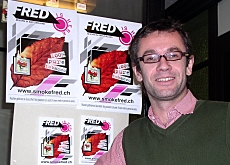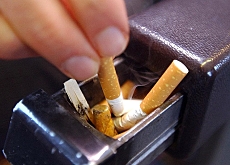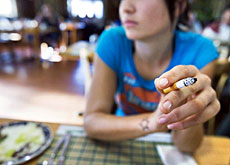Fred lights a path to success

Many would consider it commercial suicide to go head-to-head with big tobacco but Benoît Rossignol bit the bullet and he's just broken even.
The 34-year-old, who set up “100 per cent pure” Fred cigarettes just over a year ago, says he is now set on expansion despite the recent clampdown on smoking in Switzerland.
Home for Fred is a couple of rooms in a warehouse in Lausanne’s buzzing Flon district. Next door is a young fabric designer and across the street lies one of Switzerland’s premier dance clubs, MAD.
The area is a humming hotbed of small businesses and the spirit of enterprise clearly extends to Rossignol whose office is a lesson in controlled chaos, with cigarette cartons climbing the walls.
The young businessman was no newcomer to the cut-throat world of tobacco when he gave birth to Fred cigarettes in August 2004.
He spent five years at global giant Philip Morris, which has its international headquarters in Lausanne, “covering the whole spectrum” of finance, planning and marketing before striking out on his own.
“In the end I thought I know how this business works, I have my own ideas about it which were not always accepted by Philip Morris, so let’s try it out. It looks complicated from the outside but once you know the ins-and-outs it’s feasible,” he told swissinfo.
Business plan
Rossignol drew up a business plan in early 2004, initiated contacts with manufacturers, and within six months had Fred cigarettes in the shops.
He says he now sells 35,000 packets a month – up from 2,000 in August 2004 – and saw turnover last year of SFr1.4 million ($1.06 million).
According to Rossignol, his monthly sales equate to those achieved in less than an hour by the big two tobacco giants that dominate the Swiss market – Philip Morris and British American Tobacco (BAT). But he says this hasn’t stopped Fred from attracting unwelcome attention.
“When we first started there was an element of surprise rather than opposition. I know from people at BAT and Philip Morris that they closely monitored what we were doing, especially the fact that we were using the internet [for sales],” he says.
“I think ultimately they were quite sure we wouldn’t succeed, but we are becoming a bit too big now and are starting to annoy them.”
100% pure
Rossignol says he opted for 100 per cent pure tobacco, free of additives and flavouring, after witnessing the success of another brand, American Spirit.
“It was launched in Switzerland at the end of the 90s, and without any advertising – just by word of mouth – has managed to have a pretty steady growth with a price position above premium – SFr6.40 when most brands are around SFr6.
“So just by this USP – unique selling proposition – of 100 per cent pure tobacco they managed to sell quite a lot.”
Rather like American Spirit, Fred relies to a large extent on word of mouth to reach its target 25- to 35-year-old consumers. With a marketing budget of only SFr130,000 since the launch, the three staff have to do much of the legwork themselves.
Rossignol guarantees that the cigarettes are 100 per cent pure, with no flavouring or “filler” (expanded stems and scrap tobacco). He says this means that Fred consumers get more for their money, but he is quick to stress that his cigarettes are not “healthier” than other brands.
“We are not saying they are any less harmful. What is harmful in the cigarette is the nicotine, the tar, and all these elements are in Fred. Our USP is that at least you know what you are smoking.”
Funding headache
The biggest problem he has faced – apart from securing funding – has been distribution. While he now has almost blanket coverage in western Switzerland, the main German-speaking part of the country where 80 per cent of kiosks are controlled by a handful of firms has proved a harder nut to crack.
Fred is now concentrating on independent kiosks in Zurich, Basel, Bern, Biel, Winterthur and St Gallen in order to gain a foothold in the German-speaking market.
Rossignol claims he has faced a permanent struggle for cash since he injected SFr300,000 of his own money to get the project off the ground. Apart from one SFr200,000 loan in December 2004, the banks have repeatedly shut the door, which continues to be a source of much frustration.
“For any new start-up – and I would say it’s even worse in IT – there is absolutely no chance in Switzerland of getting support from the banks. They won’t take the risk. We are still at the stage where we need seed capital. In March last year I had no more money and had to turn to friends and family.”
One would have thought that burgeoning efforts to restrict smoking in public places in Switzerland would be another bone of contention, but Rossignol sees this as a boon rather than a burden for Fred.
He believes any decline in tobacco consumption is unlikely to affect a company as small as his. Instead he feels that those who continue to smoke will increasingly turn to a good quality product such as Fred.
“Once we have secured enough distribution, I think we have sufficient energy and initiative to make it work,” he says.
swissinfo, Adam Beaumont in Lausanne
Authorities in Switzerland have been turning up the heat on smokers.
Smoking was banned on all public transport on December 11.
In October canton Ticino’s parliament announced a smoking ban in public places. Rightwing politicians are trying to overturn the move.
Geneva is set to vote on a similar ban later this year.
8,300 premature deaths are attributed to smoking each year in Switzerland.
Fred cigarettes retail at SFr6 a packet. Rossignol says this breaks down as follows: SFr0.40 manufacturing costs, SFr3.90 in tax (VAT, import duty and excise), SFr1.10 distribution costs, leaving a profit of SFr0.60.
Fred cigarettes, which come in “light” and “super light” versions (hand rolling tobacco is in the pipeline), are produced in Hungary by an ex-Reynolds factory.
The additive-free tobacco is an American blend – a mixture of burley, oriental and Virginia tobacco – which accounts for 95% of the Swiss market.
A recent study, commissioned by the Federal Health Office, revealed that 29 out of 32 brands tested in Switzerland contained banned additives.

In compliance with the JTI standards
More: SWI swissinfo.ch certified by the Journalism Trust Initiative


You can find an overview of ongoing debates with our journalists here. Please join us!
If you want to start a conversation about a topic raised in this article or want to report factual errors, email us at english@swissinfo.ch.